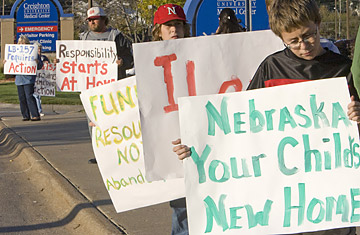
Protesters of Nebraska's safe-haven law hold signs in front of the Creighton University Medical Center in Omaha on Oct. 16
There are a couple of ways law-abiding citizens can abandon children in Nebraska. Sometimes a desperate parent will tell a child that he or she is going to the hospital for something minor, like a rash — then in the emergency room, the child waits and waits, only to discover that the doctors are there but the parent has walked away for good. Or unruly teenagers might simply be dumped at the ER door. "A parent will pull up and say, 'All right, get out of the car,' " says Lisa Stites of Creighton University Medical Center in Omaha. In other states, laws that allow parents to leave their children at hospitals or fire stations are usually limited to newborns of a few weeks or months. In Nebraska, the law failed to define the word child. As a result, teenagers as old as 17 have been abandoned.
And not just one or two. Nebraska found itself facing an epidemic of abandoned children after the legislature passed a law in July that allowed parents to leave their children at a safe place, like a hospital, without fear of prosecution. It was one of the last states in the country to pass such legislation — but the law contained a large loophole by including children of all ages. The legislature gathered on Friday in a special session to fix the safe-haven law. The day before, three more kids were abandoned at Omaha hospitals, bringing the total to 34 since mid-September, shortly after the law was passed. A 5-year-old boy was left by his mother on Thursday night; two teenage girls, 14 and 17, were dropped off earlier the same day. The older girl ran away from the ER before authorities could arrive. And a Florida man traveled from Miami to drop off his 11-year-old boy earlier this week. (See Pictures of the Week.)
But while Nebraska can easily narrow its statute, dealing with the underlying causes of abandonment is much harder, child-welfare experts say. "These parents had to be totally overwhelmed to do something like this," says the Rev. Steven Boes, president of Boys Town — the original safe haven of Father Flanagan fame, which happens to be headquartered in Omaha. Once upon a time, Depression-battered parents would buy bus fare for their children and hand them a sign that read "Take Me to Boys Town." Their counterparts today "are parents who have tried to navigate the system for years, and this is their last resort; these are parents who ran out of patience too darn fast and gave up too early, and everything in between," says Boes.
For each abandonment, there are just as many parents who arrive at a safe haven but, in the end, don't leave their child, says Courtney Anderson of the Immanuel Medical Center in Omaha. A medical social worker, she was on duty in the ER when some of the abandonments unfolded. "Some parents want us to threaten the child — they feel that would set them straight," she says. Some parents cry; others are merely angry. Some children begin to cry when they figure out what's going on, while others are hardened veterans of the foster-care system and "are used to these ups and downs."
Five of the children abandoned in Nebraska have been from out of state, but most are local. A majority of the children are older than 13 and have a history of being treated for mental-health issues. Nearly every abandoned child came from a single-parent household. In September, one father walked into a hospital and left nine children, ages 1 to 17. He reportedly told hospital workers that he'd been overwhelmed since his wife died a few days after their youngest was born.
Boes says one root of the abandonment problem is that there is simply not enough help for parents in crisis. In Nebraska, for instance, there are only six child psychiatrists in the entire state, he says. "It's a national problem ... insurance often won't pay after six visits — so if the kid's not 'fixed,' you're out of luck. States have a jumble of services. It's a puzzle with missing pieces."
State senator Mike Flood, speaker of Nebraska's unicameral legislature, introduced a bill on Friday to change the law to cover newborns up to three days old only. He expects a debate on whether to expand coverage for the first year of a child's life, which some states do. "We'll be looking at the bigger issues next year," he promised. "Mental illness, the behavioral-health workforce, caseworker loads."
Boes says the parents who are leaving their kids shouldn't be demonized. "Father Flanagan said it: he learned there was no such thing as a bad boy. And I have come to believe there is no such thing as a bad family." There is a 12-year-old girl at Boys Town now who desperately wants to see her mother, he says, the same mother who broke the girl's arm and used to hold her down and burn her with cigarettes. "Why, I wonder? But if she can see something good there, surely there is good in all families."
